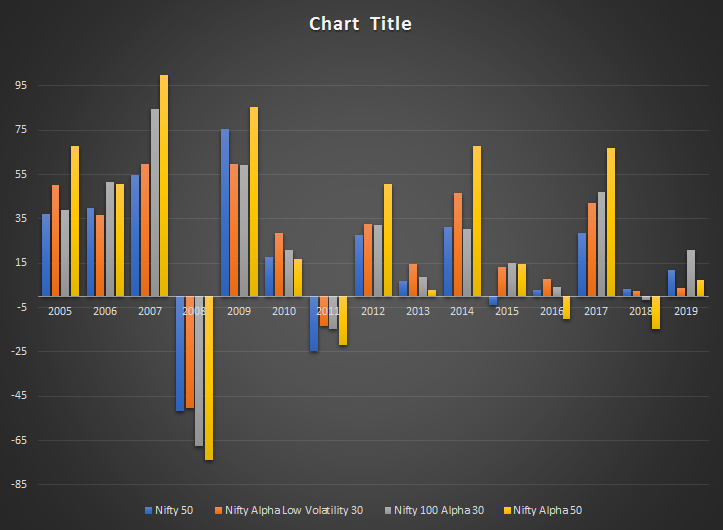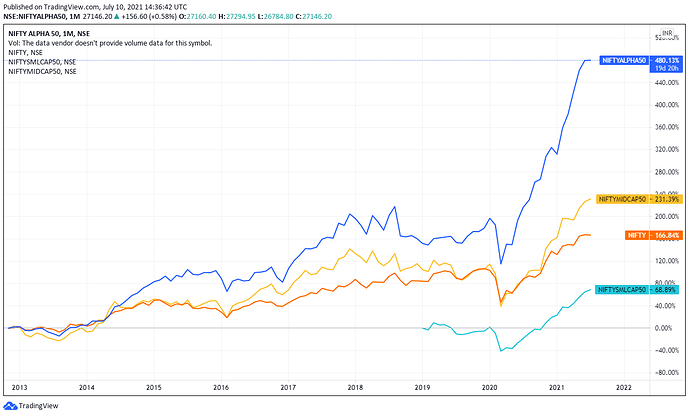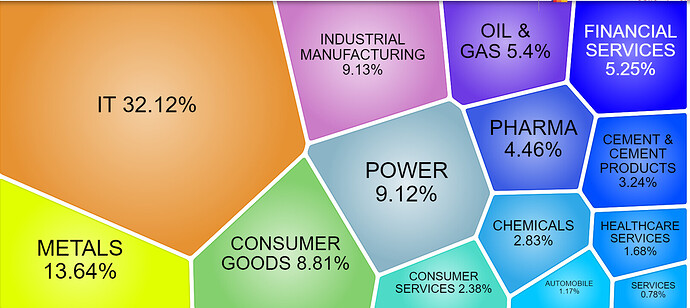check this tw
The four schemes are:
Motilal Oswal Midcap 150 Index Fund
Motilal Oswal Nifty 500 Index Fund
Motilal Oswal Nifty Bank Index Fund
Motilal Oswal Nifty Small-cap 250 Index Fund
In India majority, ETF’s are based on Broad-based indices.
In the past few years, NSE has created several indices.
Many of them have consistently given better returns than broad market indices.
Back data for some of the sectoral & strategy based indices have been made available on NSE Website.
The following indices have consistently given more returns compared to broad-based Indices.
-
Nifty FMCG
-
Nifty Consumer Durable Goods
-
Nifty Alpha 50
-
Nifty 100 Alpha 30
-
Nifty Alpha Low Volatility 30
As of now, there are only 15 funds based on Sectoral & Thematic indices. 10 out of these 15 are based on Nifty Bank, Nifty Pvt Bank, Nifty PSU banks.
There are no ETFs based on Nifty FMCG or Nifty Consumer durable goods, which have given consistent returns.
Looking at Strategy Indices, there are only 7 ETFs based on Sectoral Indices.
As of now ETFs based on Nifty Low Volatility 30 & Upcoming Nifty Alpha Low Volatility 30 are the only ones that have outperformed Broad-based Indices significantly.
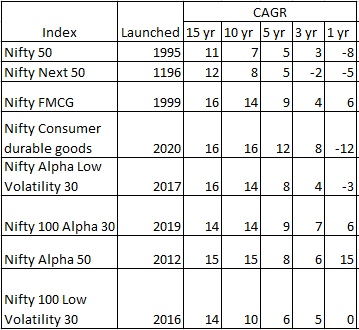
Comparing per year return, Strategy based Indices have outperformed Broad-based indices several times. Also, the Drawdown of Nifty Alpha Low Volatility 30 & Nifty 100 Alpha 30 is limited compared to Nifty 50.
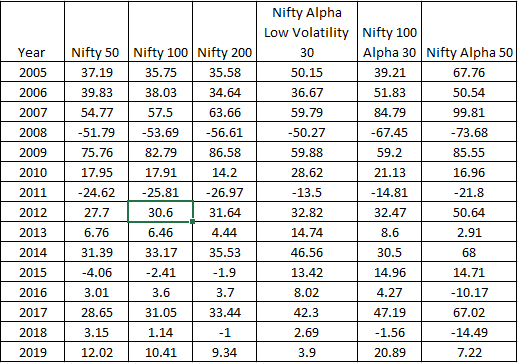
For those who are considering investing in index or ETF, the better options are ETFs based on Nifty Low Volatility 30 & upcoming ETF based on Nifty Alpha Low Volatility 30.
Thanks for sharing.
What is your view on selling of ETF? When should we consider sale of ETF?
Also which is better; index ETF or Index MF?
I was looking for SIP with a horizon of 10 to 15 yrs, so never thought about selling.
But if I have to sell, I will try to identify the period when both Broad-based indices and strategy based indices corrected. If we can identify such opportunities, we can increase returns by selling and buying again at a low price or increase the buying quantity during a correction.
In the chart above, we can see the Indices corrected in 2008, 2011, 2013, 2016, 2018 & now in 2020. So almost every two or three years, these Indices give correction when the gain is either negative or very low. These patterns can be identified and used to increase returns.
About ETF or MF, both have their pros and cons. As I believe in buying and selling, I always prefer ETFs. The tracking error and expense ratio can affect performance of an ETF against index fund. But I can compensate that by selling when correction is anticipated and Buying again/more at lower levels.
Am doing experiment, its just in initial phase and will wait to conclude it. My intention is to encourage others likeminded friends to do the same so that we can able to conclude effectiveness of ETF.
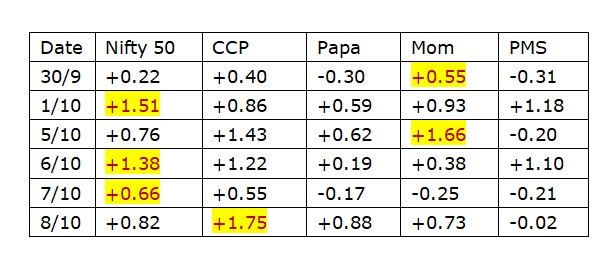
Am maintaining family’s portfolio in Moneycontrol.com. Every evening (post closing) I just right down changes as per table; self-explanatory.
In last 6 days, Nifty 50 beaten other portfolio 3 times (50% success). Will like to continue it for month or so to conclude.
Do with your portfolio and share experiences.
Hello everyone,
Question on passive investing in Index funds (e.g. UTI Nifty 50) vs ETFs (e.g. Nippon Nifty BeES) for NRIs
Everywhere I read on the internet, it says ETF is far cheaper than an Index fund, but for an NRI just to clarify my understanding:
costs via Index funds: 0.1% TER (direct MF)
costs via ETF: 0.1% Brokerage with each buy and sell (I am with Zerodha, discount broker) + Bank PIS charges (100 Rs. per transaction + 18 Rs. GST) with each buy and sell. (is it only HDFC that charges this or is it standard??)
So I wouldn’t be wrong in concluding that, for an NRI wanting to passively invest in the index via SIP, an Index fund is cheaper than ETFs??
Am I missing something here?
Thanks for your help!
Hi,
It’s not just about cost, but also three other components:
"
Liquidity
Tracking error
Dividends (reinvestment, distribution or swaha)
The below table summarizes these three points.
| Basis | Mutual Fund | ETF |
| Liquidity | No problems with redemption | Liquidity depends on market conditions and third parties (who want to trade on the exchange) |
| Tracking Error | Has a smaller tracking error than ETFs | Tracking Error are large and dependent on market conditions |
| Dividends | Option of reinvestment/distribution | "The income received by way of Dividend shall be used for recurring expenses and Redemption requirements or shall be accumulated and invested as per the investment objective of the Scheme." |
freefincal is an amazing website with incredible research-based content. The author has compared the tracking errors of ETFs and mutual as well as among mutual funds.
The quote in the dividend section is from Nippon’s document. The choice is between “we may pay you, or pay ourselves or do something else with it” vs “We will reinvest YOUR dividends to reduce tracking error and increase value”. To be fair, NIFTY BeES has a benchmark of NIFTY 50 and not NIFTY 50 TRI.
A mutual fund seems to be a better option (with wider choice ranges as well) for a long term accumulation action. ETFs are better for executing a particular strategy or some trade idea that one may have from a relatively shorter time frame (and dividends don’t matter). Among the ETFs, only Nifty BeES has some serious volumes being traded daily.
"This is my view. I could be wrong. Would love to hear other views as well.
An index fund is definitely better than an ETF (NRI or otherwise).
Why we are looking here for ETFs.?
Yes, as per reports , most of MFs fails to beat Index.
This statement is true for PMS as well.
Passive investing is great , so why don’t your friend do passive stock investment.
For example :
Britannia, Shree Cement, Asian Paint, Pidilite, Berger paint , Hdfc life , HDFC / Kotak , bajaj finance, Ceat or MRF
Stock gives lots of flexibility to re rebalance whenever needed.
Note: These are no brainer and time tested stocks. Even in bear market they stay strong. You can enter in these stocks anytime , average it when indian market as a whole is down. Also Dmat accounts allow SIP on chosen shares.
ETFs are good but since exit and entry of stock is not in our hand. Also focussing on only these stocks and not trying to add anything extra will pay you dividends and great return.
Just a thought from my side.
Thanks @MyCapitalNotes and @wexler, I had read the freefincal’s article, wonderful website! He especially compares Nippon Etf and UTI Index fund in this post (https://freefincal.com/nippon-india-etf-nifty-bees-vs-uti-nifty-index-fund-which-is-better/)
So I suppose it is safe to say if one wants to do SIP, an Index fund is certainly a better option, considering relatively lower cost + liquidity, tracking error and dividend
Disclaimer: I am relatively new to stock investing, been investing in mutual funds since 2018.
I agree with your point, but for me it will become semi-passive/semi-active investing. If I do not have an automated SIP option, I will need to get involved monthly and also bear costs on monthly basis. Involving myself monthly will also result in worrying about prices.
While I acknowledge these are great stocks currently, over a 3-5 year period if the choice changes then I will need to again make changes.
But let me repeat, fundamentally I agree with your point and this old article in the economic times drove the point home for me.
The stocks you have mentioned have given good CAGR and created wealth for the investors.
But can we be certain that these stocks will give these returns in the future too?
For someone like me, who doesn’t have any knowledge about value investing, Index investing is a blessing.
NSE has come up with several multifactor-based indices.
By investing in Indices like Nifty Alpha Low Volatality 30 we are investing in quality stocks with alpha.
Active investing in good stocks will always give better returns, but for that we need good knowledge about several factors affecting the portfolio performance.
Some people like me are happy with passive investing and 16 to 17% CAGR from indices like Alpha Low Volatility 30 or 19 to 20% CAGR from index like Nifty 200 Momentum 30.
NFO for Nifty 200 Momentum 30 is open for subscription. N200 momentum 30 is showing good returns based on the data available on nifty indices website.
Also ICICI has filed draft for FOF based on Alpha Low Volatility 30.
Hello, I wanted to understand how much difference would transaction costs make to the index since Nifty 200 momentum 30 index fund would have larger churn compared to Nifty index fund.
Strange case of ETF investing.
The 52 weeks high is 178. That was intraday high on 15/2/2021.
On 15/2/2021; High: 178.00; Low: 157.81 and close: 159.25
Today (28/5/2021) it’s around 156.
If somebody bought at the Highest level on that day, it’s still 12% lower, whereas the Nifty is higher than it was on 15/2/2021.
Retail investors should prefer index funds rather than etf.
For etf buying and selling put limits instead selecting market price.
Huge outperformance by Nifty Alpha 50 index over multiple years. Almost 3x of Nifty50. I prefer FOF based on ETF than ETF just to avoid liquidity and impact cost issues though this means sacrificing few basis points. Also from my knowledge if FOF is based on equity ETF then taxation will like normal equity fund (e.g. ICICI Prudential Nifty Low Vol 30 ETF FOF)
Incidentally Kotak has filed papers with SEBI
Kotak MF to launch two ETFs - The Hindu BusinessLine
Disc : Keenly watching this place for investing in future, invested in ICICI Prudential Nifty Low Vol 30 ETF FOF.
whats the take on a mixture of nifty 50,nifty next 50 & Nasdaq 100 in in equal weightage of 33% each. this means a total of 200 companies comprising of top 100 Indian companies & top 100 US tech companies
Does this happens usually, like I want to ask if I buy SBI nifty ETF or invest in SBI nifty 50 mutual fund, does this usually make a difference or not? You’re saying the difference is there because of the tracking error?


